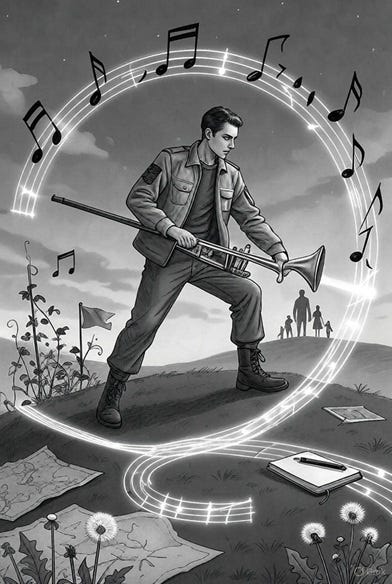Chapter 2: Protecting Priorities - Boundaries as Battle Lines
On the road From War to Writing, healthy boundaries are like defensive battle lines: they require strategy, occasionally shift, and don't always last forever.
“From War to Writing” is a story of hope and healing.
This is my first book and is a work in progress. All feedback is welcome.
Prologue: My First Attempt at Solitude
Introduction: Weaving a Tapestry of Healing from Curiosities in the Chaos
Table of Contents: From War to Writing
Chapter 1: Stop The Spiral - “I Let My Dandelions Grow”
Chapter 2 - Boundaries as Battle Lines
Dear Reader,
When travelling the road From War to Writing, we have to get back to basics.
Early in my journey, I discovered it was vital to identify and protect personal priorities. After the chaos of stopping the spiral, I had to focus on what mattered most to me, who I was and who I wanted to become, and figure out how to grow toward those goals.
Doing so looked like drawing battle lines.
In Chapter 1, we talked about how to stop the spiral. In Chapter 2 we’ll take the next step by protecting personal priorities.
On the road From War to Writing, setting healthy boundaries can be like setting defensive battle lines:
They require strategy
We set them to protect our vital interests
We adjust them as the situation dictates
Boundaries are battle lines for survival, and we need to protect our time, energy, and identity.
If you’re on a healing journey and looking for ways to get your footing and protect things that are important to you, read on for examples of how setting battles lines worked for me along the road From War to Writing.
Pre-Battle Briefing
Like any solid military operation, a pre-mission briefing is in order. :)
Treat all information in this post as entertainment, not professional advice. I am not a doctor. I am not a therapist. I am not licensed, certified, or experienced in any professional mental health capacity.
Note
Healthy Boundaries — Typically, when we think about healthy boundaries we think about interpersonal relationships. For purposes of this article, healthy boundaries are more like personal guardrails -- healthy boundaries for setting priorities to align thoughts/goals/desires and actions.
Caution
Avoid Over-Correcting — When I first embraced my drive for solitude, I alienated much of my support base. Finding an appropriate balance and long-term set of healthy boundaries for interpersonal relationships should be a goal through this entire journey. See my Empathy Tank article for thoughts on how important it is to maintain a connection with people around you.
Warning
Avoid/Minimize Collateral Damage - Healing journeys will be messy, and collateral damage should be avoided. In my case, I’d burned up about all the sympathy, compassion, and empathy I could reasonably expect from my family before I stopped the spiral. (For more tips, I also addressed this a bit in my speculative discussion on The Empathy Tank.)
Keep in mind that you want to avoid making your situation worse, for yourself, or those around you, so take information in this chapter with a grain of salt and use deliberate discretion (or perhaps military precision) when drawing your battle lines.
Drawing Battle Lines - Initial Strategy
When healing journeys get intense, it can feel like a constant battle. When war is upon us, we can pick our battles carefully and find hope in our fight to survive.
We Don’t Always Choose War
There’s a good chance none of us choose to go to ‘war.’
I’ve said I don’t like to pick fights I can’t win. Well… The road From War to Writing was full of battles I didn’t pick… and couldn’t afford to lose.
As we discussed in the Prologue, when I started my healing journey, daily functioning was a challenge. My mind was under assault and in full battle mode every day by 0900.
At some point, it felt like the line from The Lord of the Rings when Aragorn says: “Open war is upon you, whether you would risk it or not.” 1
Realizing I was in a serious fight to keep my life ‘on-track’ was a first step to adopting the mindset needed to survive.
I was on war footing, even though I didn’t want to be.
Defensive battle lines needed to be drawn.
We Fight to Survive - Take Care of Yourself
Like an oxygen mask, we have to take care of ourselves first before we can help others.
This isn’t selfish. It’s survival.
Our ability to care for things — daily responsibilities, cats, dogs, kids, or even a house plant — degrades when we’re in survival mode. When we don’t properly care for ourselves, we’re not caring for others as effectively as we think we are.
When we find ourselves on war footing, we need to plan and take action.
Before I started deciding what to protect, I had to figure out what I wanted to prevent in order to survive.
I wanted to avoid:
Getting ‘Committed’ - In the depth of my journey, the VA crisis line was on my mind frequently. The VA offers in-patient care at ‘domiciliary’ facilities, and I hear the treatment is typically decent. I would encourage anyone who feels that type of care is warranted to seek it. I almost checked myself in a couple times.
Leaving My Family — Staying with my family was of paramount importance. Many times, it would have been easy to just leave. Or at least, that occasionally seemed like the ‘best option.’ While there are certainly valid reasons to leave a family, those lines weren’t crossed, and I chose to do what I could to make things work.
Living on the Street — This was a real concern for a while. If I hadn’t stopped the spiral… If I hadn’t figured out how to climb back up and get on a solid footing with hope, I’m not sure where I’d have ended up. At my retirement ceremony I said my wife saved my life by giving me motivation to be a better person. I kept that in mind on this point.
Simply recognizing these as potential paths to avoid helped keep me away from them.
I found real healing progress when I focused my efforts on a few personal core priorities to protect … and picked those battles carefully.
Pick Our Battles Carefully
When you’re in survival mode or it feels like you’re being attacked from all sides, it is important to pick your battles. We can only fight so many battles at once. We need to protect our most important things.
This is a good example of using the “Big Rocks” or “Glass Balls” strategy from Chapter 1 as a planning tool.
Your journey likely looks different than mine. Your priorities and vital interests to protect will be different. What matters is identifying the most important things to safeguard with deliberate action … battle lines.
In my case, I picked three - Writing is industrious. Music is personal. Driving is for family.
I chose to protect:
Writing — Writing became a type of solace for me and helped unpack the chaos of my journey. Protecting my writing time has become a major point of stability and routine to help pave the road to healing. I touched on that more in my article about Why I Write.
Music — After putting my trumpet playing on hold for most of my career, joining a band was a key goal. It wasn’t easy, but success was encouraging. I touched on this in my article about how Healthy Boundaries Saved My Life-Long Goal.
Driving to School — Driving my daughter to school allowed me to spend a few minutes each day chatting with her — to maintain or revitalize a connection that had weakened. This is a good example of the connection feedback loop in The Empathy Tank.
Protecting these priorities with the battle lines helped pave the way to healing.
Adjusting Strategy
Before feeling a true sense of progress and lasting healing, it took some time for the ‘war’ to evolve. Initial battle lines were set, then reassessed and adapted.
Initial Battle Lines
In the initial phase, battle lines are messy. Setting them is more important than ‘getting them right.’
Writing — This initial battle line was one weekly target, and a mess of poorly directed effort.
I started by protecting one publishing goal per week - every Saturday. I tried blocking out time 6 days a week to write. I tried various schedules, routines, and motivational hacks. If there was a productivity trick out there to help beginning writers, or those struggling with daily task management, I probably found it.Music — This initial battle line commandeered an entire day every week.
It was vital that I attend our weekly evening rehearsals, and that was a major struggle. I treated each rehearsal day like a glass ball. I blocked out my entire day, cleared all appointments, and discovered the joy and occasional usefulness of taking naps.Driving to School — This initial battle line blocked out a specific 8-hour period every night.
I treated driving my daughter to school like crew rest. An early (for me) bedtime was non-negotiable. Challenge with ‘proper’ bedtimes have always been common for me, and mental health struggles didn’t help. That made setting this battle line particularly important, oddly challenging, and satisfying when I ‘held the line.’
No Plan Survives Contact with the Enemy
Just because a battle line is drawn, doesn’t mean it’s static. After setting initial battle lines, some adjustment is typically prudent.
Though I was generally meeting my goals and protecting my vital interests, I wasn’t doing it as effectively as I could. I was still under siege. I had to acknowledge the reality of the situation and find a more effective path forward.
Writing — As I explored all the details to better write for an audience, and specifically to grow on Substack, it was overwhelming. My writing goal is always under attack. Trying to grow or tackle more than one deadline a week was simply too much.
Music — Blocking out an entire weekday day every week was not always sustainable. I kept the day reserved, but it didn’t always ‘work.’
Driving — As my overall mental health and routines stabilized, getting proper rest to wake up and drive at 0700 became much less stressful. That battle line actually worked as intended. :)
Evolving Battle Lines
On the road From War to Writing, battle lines should occasionally be reevaluated to make sure they remain effective and focused on protecting our biggest priorities.
After re-assessing battle lines and taking stock of how well they actually worked in practice, a few modifications helped stabilize and solidify my progress.
Writing — I stick with only one weekly goal. Rather than fight a rigid structure each day, I find a rhythm that works for me and try to write most of each article by Thursday… and block out most of each Saturday to finish things up. Apparently, I work best under pressure with a looming deadline. Also, things that drive readership growth were simply too much to handle, so Substack growth sits on the back-burner … for now. Focused effort reduced stress.
Music — This battle line became less necessarily rigid as my healing journey evolved. While I still keep rehearsal day as open as possible (and nap when able) a bit of healing has made it possible to handle some unexpected chaos and still make rehearsal.
Driving — This battle line became irrelevant. My daughter got her license. She’s growing up. I miss it, even if it means I can sleep in. Now I find more creative way to engage, like actually asking about how school was, and wanting to hear her answer. :)
As we adjust our battle lines, we increase our chances of meeting our goals and healing more effectively. Sometimes our battle lines need big adjustments. Other times, small tweaks are plenty.
Sometimes we heal enough the old battle lines are no longer necessary.
Hope and Healing
If you are on a healing journey and considering drawing battle lines of your own, I hope the examples above help you identify and protect the priorities you hold most dear.
When we recognize we’re on a war footing, deliberately set priorities, draw battle lines, and occasionally reassess our strategy, healing becomes possible… and we’re making progress along the road From War to Writing.
Until next Saturday, I wish you a pleasant week.
Yours on the healing journey,
- Terry 8^)
Your feedback is valuable! This chapter will be revised before going to print and reader input makes it better for everyone. :)
If you have thoughts to share or questions to ask, please add a comment below or send me a DM on the Substack app.
From the Lord of the Rings:










Another brave share, Terry. The part where you laid out what you wanted to avoid to survive is so poignant.
Keep up the good work, I enjoyed reading!